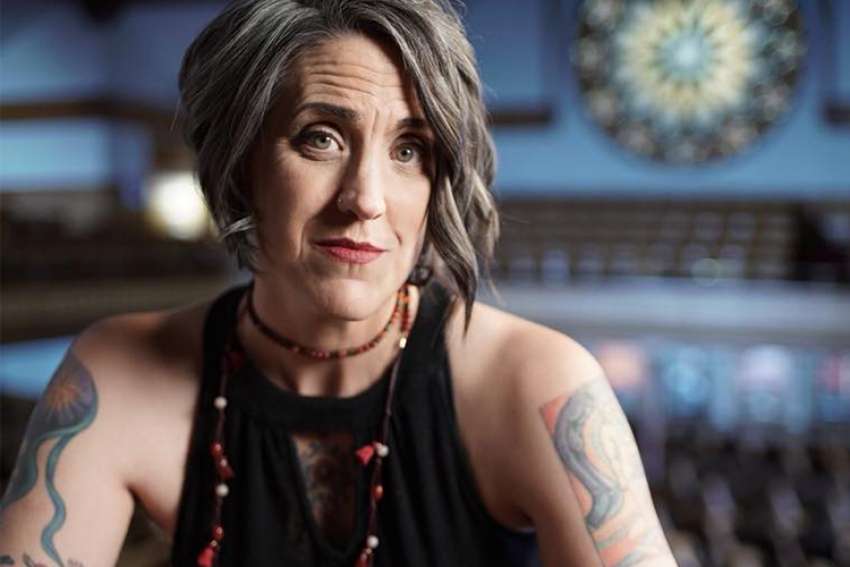With my friend’s recommendation, I clicked on the two-minute video sermon and I was immediately fascinated. I was the 22,111,056th person to watch it. That’s 22 million views through a “digital church.”
The message from Nadia Bolz-Weber did make sense: compassion and forgiveness are not acts of weakness but “bad ass” ways to disconnect us from the bad things done to us. It can be easily found on Facebook. Not exactly a unique thought, but it was who and how she said it that intrigued me and sent me on an hours-long journey to find out more about this interesting character named Bolz-Weber.
The tattoo-laden Pastor Nadia is an Internet sensation judging by the number of views to her numerous sermons like Separating Self from Selfie, No One “Has it All”, and Welcome to the (#MeToo) Apocalypse. Combined, her quick-hit sermons on Facebook exceed 30 million views.
Besides a theologian with the degree to prove it, Bolz-Weber is also part online therapist — and a whole lot more.
Approaching age 50, Bolz-Weber has an interesting — and often grimy — back story. As a teen, she rebelled against her family’s fundamentalist Christianity and spiralled into a world of drug and alcohol addiction, sleeping around and performing stand-up comedy in a grungy Denver club.
In her New York Times best-selling autobiography Pastrix: The Cranky Beautiful Faith of a Sinner and Saint, she goes into detail about benders, tattoos she got from junkies, a stint with Paganism and the suicide of a close friend that led to her epiphany. Until that point, she was sure she’d be dead by age 30.
(Her epiphany reminds me of a relative who at age 39 — and in a bar after a funeral of a friend — listed on a napkin all the people he personally knew who died premature, violent deaths. The number was near 40 and at that moment he gave up violence, drugs and booze and has been clean for 22 years.)
Bolz-Weber went to Alcoholics Anonymous and then to a Lutheran seminary. Recognizing she couldn’t fit into a typical church, in 2008 she started the House for All Sinners and Saints in Denver with a mission to minister to “outsiders.”
Word spread around the Denver area and the “House” became so popular that suburbanites started to attend this downtown church of misfits. “It was awful,” Bolz-Weber is quoted in the Washington Post.
“It seemed as if her precious little indie boutique of a church might be overrun by bankers and doctors. She called her pastor friends to ask, ‘Have you ever had normal people take over your church?’” according to the Post.
Bolz-Weber called a church meeting. The newcomers talked about how they felt inspired by the liturgy and the Christ-like compassion towards outsiders, while the younger non-conformists admitted it was kind of nice to see people who looked like their moms or dads but were accepting of them. Kind of a mini-Christian unification.
After 10 years at the helm, last month Bolz-Weber left that church to focus on cyberspace ministry work and travelling to bricks and mortar churches and lecture halls interested in her progressive views of Christianity.
With sleeve tattoos, weightlifter’s muscles and a foul mouth like a truck driver, Bolz-Weber ensures she is definitely not everyone’s cup of tea. But she’s well worth checking out by simply googling her name.
And many of her messages align with messages from Pope Francis, such as when he hosted a Mass and meal for 1,500 needy and poor people at the Vatican last November.
“If in the eyes of the world (the poor) have little value, they are the ones who open to us the way to Heaven; they are our ‘passport to paradise’. For us it is an evangelical duty to care for them,” the Pope said in his homily.
“God will not ask us if we felt righteous indignation, but whether we did some good,” he said, labeling indifference as a sin of omission.
Like Pope Francis, Bolz-Weber shines light on many of the beautiful and creative ways in which the Christian Church is not only alive, but thriving. It’s definitely a different perspective, and it’s refreshing, too.
(Brehl is a writer and author of many books.)


